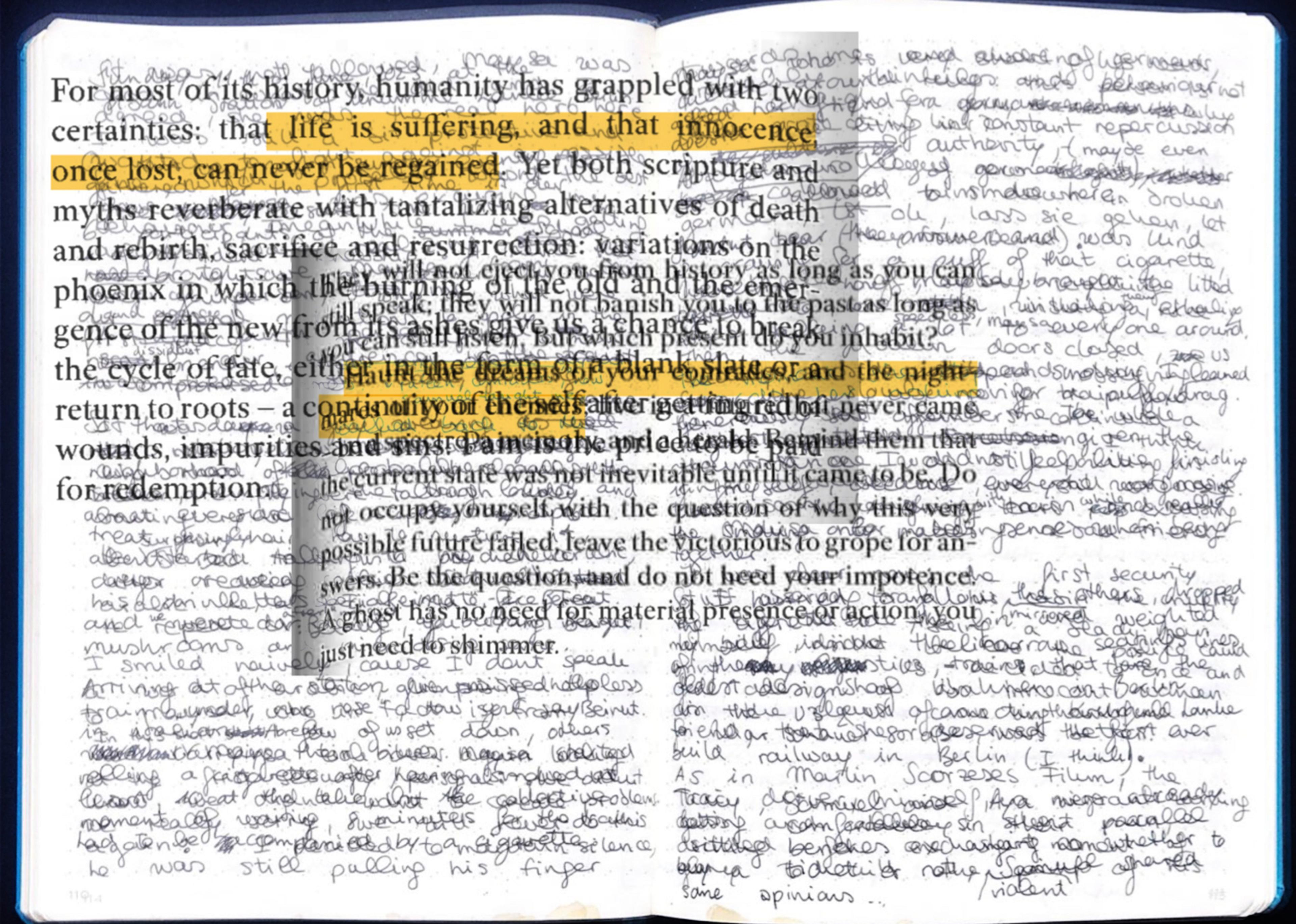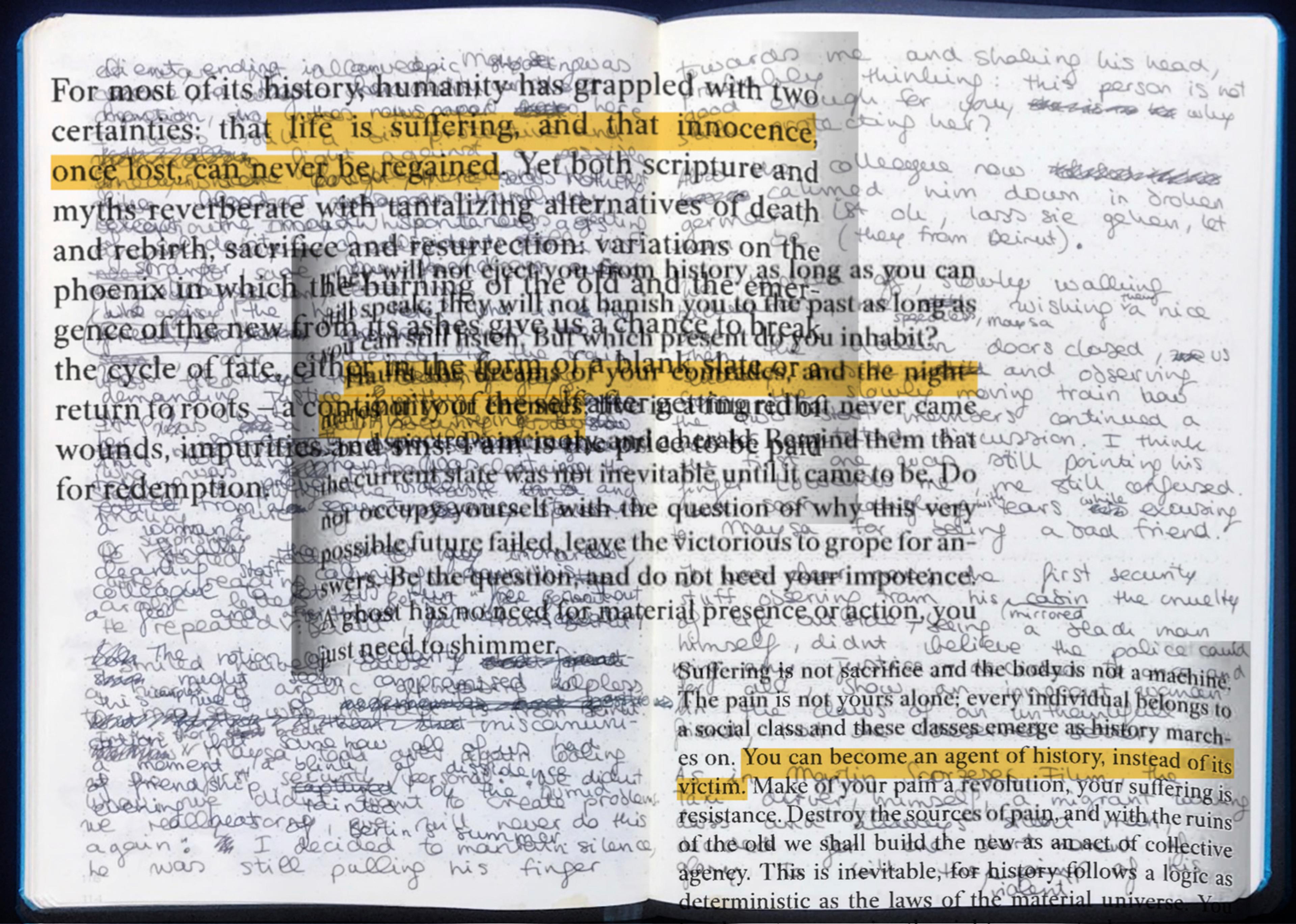School of Dissident Friendship
Deposits from the School of Dissident Friendship that need to be filed and in some cases need file notes.
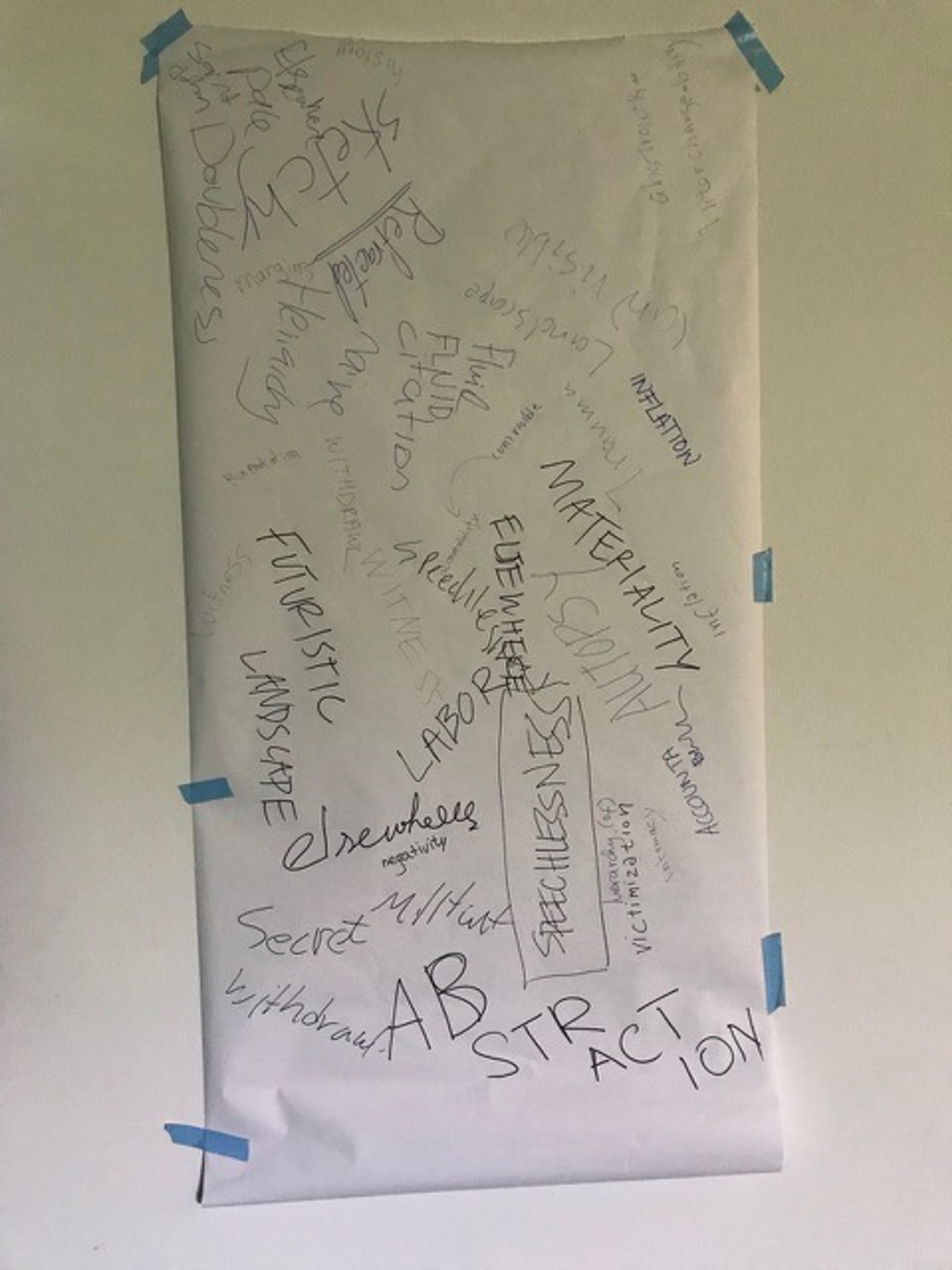
When does a revolution happens? It is either so early or so late
Is that true that every revolution is a throw of a dice? Is it that our fight is against chance?
I have asked my dear comrades and friends kindly to send me a few words from their notebook during the duration of the school.
Words that are taken from its context, diasporic words? Where are words coming from and where are they going to?
In Haytham el Wardany’s workshop, I have noted down, that language isn’t a form of communication but a form of antagonism.
Words are ruin? To build with ruin?
We will regroup around the table re-enacting the school of dissident friendships.
We will carry out our voices together, our bodies are next to each other, and for you, audience and witnesses, bear in mind, this moment carries out all moments that preceded and moments that are yet to come.
In the end, it might be a tapestry of our handwritings, a landscape of our labor. Also I have noted down in my notebook, “destabilize the division of labor.”
From Samuel Georgy
File note:
The four friends, Lamia Abukhadra, Aya Bseiso, Adam HajYahia, and Maissa Maatouk, collectively deposit a collectively written text entitled A Sequence of Alliances, which details a sequence of events initiated by a serendipitous encounter with the writings of Palestinian political prisoner Walid Daqqa. Walid Daqqa, a Palestinian writer, activist, and thinker, has been incarcerated in Israeli prisons since 1986. During his 37 years of imprisonment, he has, from the margins of space and time, written and published several texts, including A Place without a Door, Uncle, Give Me a Cigarette, Parallel Time (later adapted as a play), Dissolving Consciousness, or: Redefining Torture, alongside a children’s novel The Tale of the Oil’s Secret. Throughout his years of imprisonment, Daqqa’s writings have been smuggled, distributed, and translated through a network of untimely friendships capable of rupturing the Israeli settler colonial prison surveillance system. His writings offer critical insights into the conditions of Palestinian political prisoners, as well as speculations towards a new horizon of possibilities against hegemonic time.
On June 21, 2023, in the garden of Khan Aljanub bookstore in Berlin, the four friends attended a public reading of four texts written by Walid Daqqa. The event was organized in solidarity with Daqqa in light of his deteriorating health inside Zionist prisons, and his texts were read by Ibtisam Azem, Sinan Antoon, Haytham El Wardany, and Hanadi Zarka. Lamia Abukhadra, who grew up in the United States, and Maissa Maatouk, who attended a French school in Lebanon, had difficulty following the texts which were read aloud in classical Arabic. In response, Aya Bseiso began to translate each phrase that was read aloud in a Whatsapp text message.
One particular text titled Parallel Time, a letter written by Daqqa on the 20th anniversary of his incarcerationespecially resonated with the four friends. Read aloud by writer Haytham El Wardany, Walid Daqqa’s Parallel Time describes the temporal fractures experienced within the prison cell equidistant to the “social time” experienced outside of it and which he briefly experienced in the visitation room of the prison. The dispersive nature in which Daqqa’s texts were mediated through a series of actions that included smuggling, distribution, and spontaneous translation, became central to understanding the context in which prison literature and artistic forms of resistance exist. Following the event, Abukhadra, Bseiso, HajYahia, and Maatouk were inspired to reflect on the sequence of mediations, which made the encounter with Daqqa’s text possible.
In addition to the collectively written text A Sequence of Alliances, the deposit also contains the original letter written by Daqqa, a transcript of a WhatsApp conversation, and a bibliography that documents and transmits a series of intellectual, imaginal, and political alliances that move past boundaries of incarceration, borders, and barriers of language that formed to bring Daqqa’s words to the four friends.
Deposit from the four friends Lamia Abukhadra, Aya Bseiso, Adam HajYahia, and Maissa Maatouk consisting in text, screenshot, transcript of Whatsapp conversation, reading list. Keywords: sequence, friendship, solidarity, Parallel Time, Palestine, incarceration. Date: 23 June 2023, edited 11 August 2023.
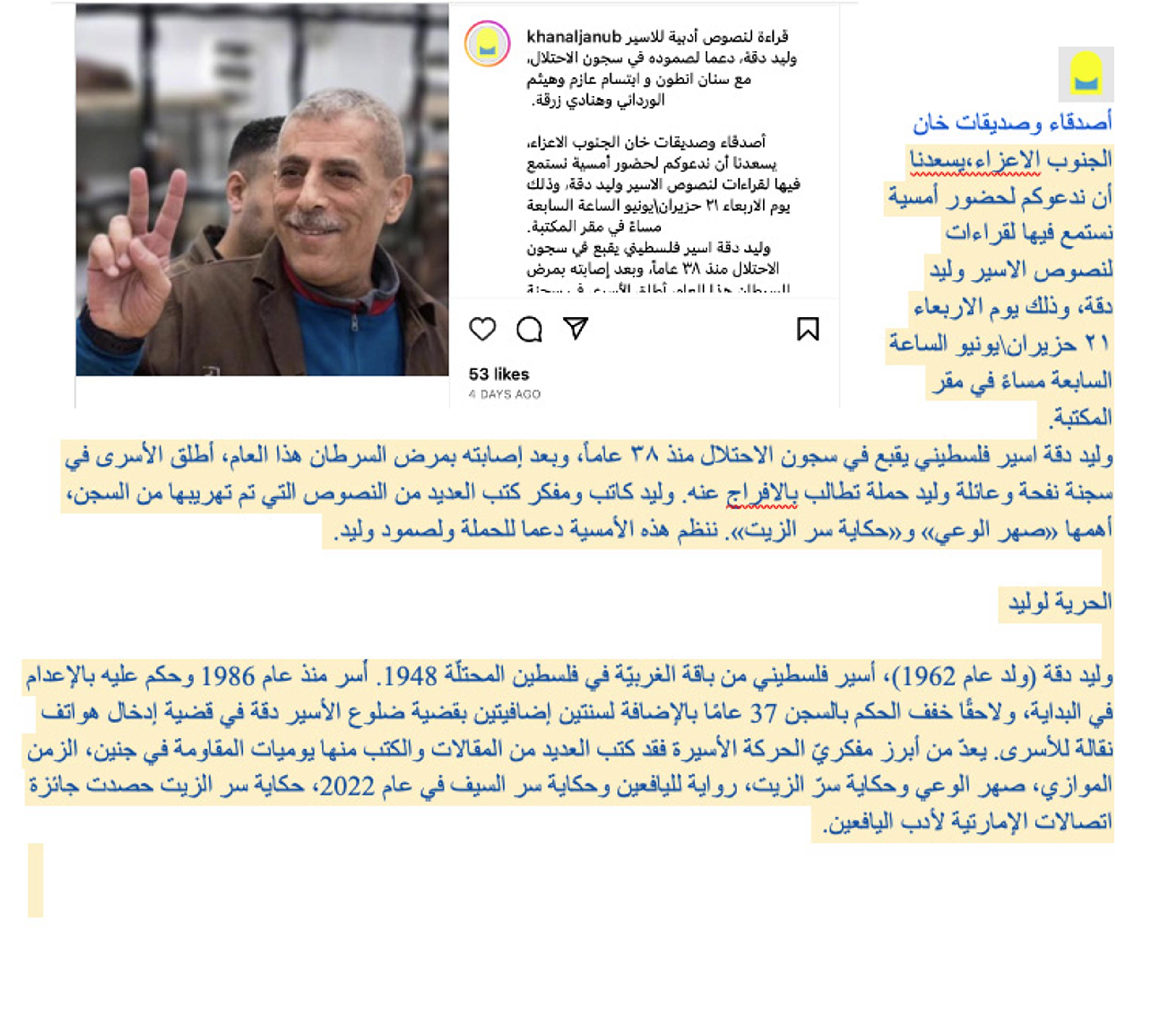
Annex I
Dear Avery,
Hope you are feeling sound!
I wrote another scene for that project I told you about, Alien without Extraordinary Ability, based on our last conversation on names. I promised I’d share more thoughts, so here they are: Growing up in China, I adapted many different names in my English language classes. I started as “Lily”, assigned by my English teacher. I did not like it, since my Chinese name is quite unique. So I kept changing it: I found most of the names on a Chinese website “English name A-Z”. Now, however, due to the reason we discussed, publicly I go by the name Xiao Xiao, and a few other names I don’t usually tell people. I came to Germany as a student, and now trying to stay as an artist. Like every non-EU artist, I think a lot about visas. I got to know this particular type of visa a few years ago: Alien of Extraordinary Ability is a type of visa that is issued in a few countries in the world to give priority to certain foreigners who are seen to have great talents in science, art, sports, or any other categories. Being called the “geniuses visa”, one of the examples of the recipient of such a visa is the famous Melania Trump.
Aliens of Extraordinary Ability are rewarded with the right to stay, but what happens to the aliens without extraordinary ability? Who are they? Well, I also don’t know much about them. There is no definition of them in the policy document, and usually, they don’t get as much media appearance as Melania. I do know one thing, however: they usually go by many names, for example, 小花梅、铁链女、八孩母亲,李莹,杨某侠,姐姐, the chained woman. Apparently, these can all be the same person.
Since two years ago, I have been working on this, first as a game at the research program on New Politics and Afrofuturism at the University of the Underground, and now, it is developed through the process at Asian Performing Artist Lab, as a performance with East Alien Company, a performance collective based in Berlin with Yve Oh and Yumo Cheng. I have often been questioning my own standpoints in such a process, and besides our common oppressor, why do I feel that we have shared fates?
I think I now might have an answer. Before our last conversation, I have been haunted by some stories I recently heard. The step-mom of a friend of mine has a group of friends who were born somewhere in China. These women were sent to Germany with tourist visas by an agency. They have been working in a massage salon since they arrived. Some of them also have to do sex work, and some do not. Their passports were taken away by the agency the moment they arrive in Germany. Since then, they have been living here without any document to validate their existence. Some of them left or were forced to leave after a while. Some of them stayed. They built a whole new life here, found partners, had kids, and even started businesses.
They often have many names—some names are given by their family, some names are given by the people who send them around, based on the fake passports they are told to use in border control, some names are used in their work, and some names are used by their current families and friends.
My dissident and migrant friends often do not share the same views on the politics of here and now as me: some asked me, why am I not siding with the ultimate freedom? I know, the socialist vision and postcolonial discourse have been weaponized by the very core of our struggle; some asked me, why am I working on border and migration, a “European problem”? Aren’t there more responsibilities to be taken back home? This scene I wrote after our conversation, is my answer to how and why the synergy of my daydreaming and nightmare manifests as this project.
I have hereby attached a document with some fragments of this still ongoing project, from the latest draft of the new scene, fragments of a published scene, to some previous game design snippets. If there is still a chance, I would love to deposit it at Hawthorn Archive. I have attached a bunch that represents my process and different versions of the project, but please feel free to take and cut whatever you find fitting.
Regarding names, I have checked again and I think at this point I am comfortable to have it under my name, either Xiaoji Song 宋晓霁 or Xiao Xiao 销销.
Best regards,
Xiao Xiao 销销
Email letter and deposit from Xiaoji Song 宋晓霁 or Xiao Xiao 销销.
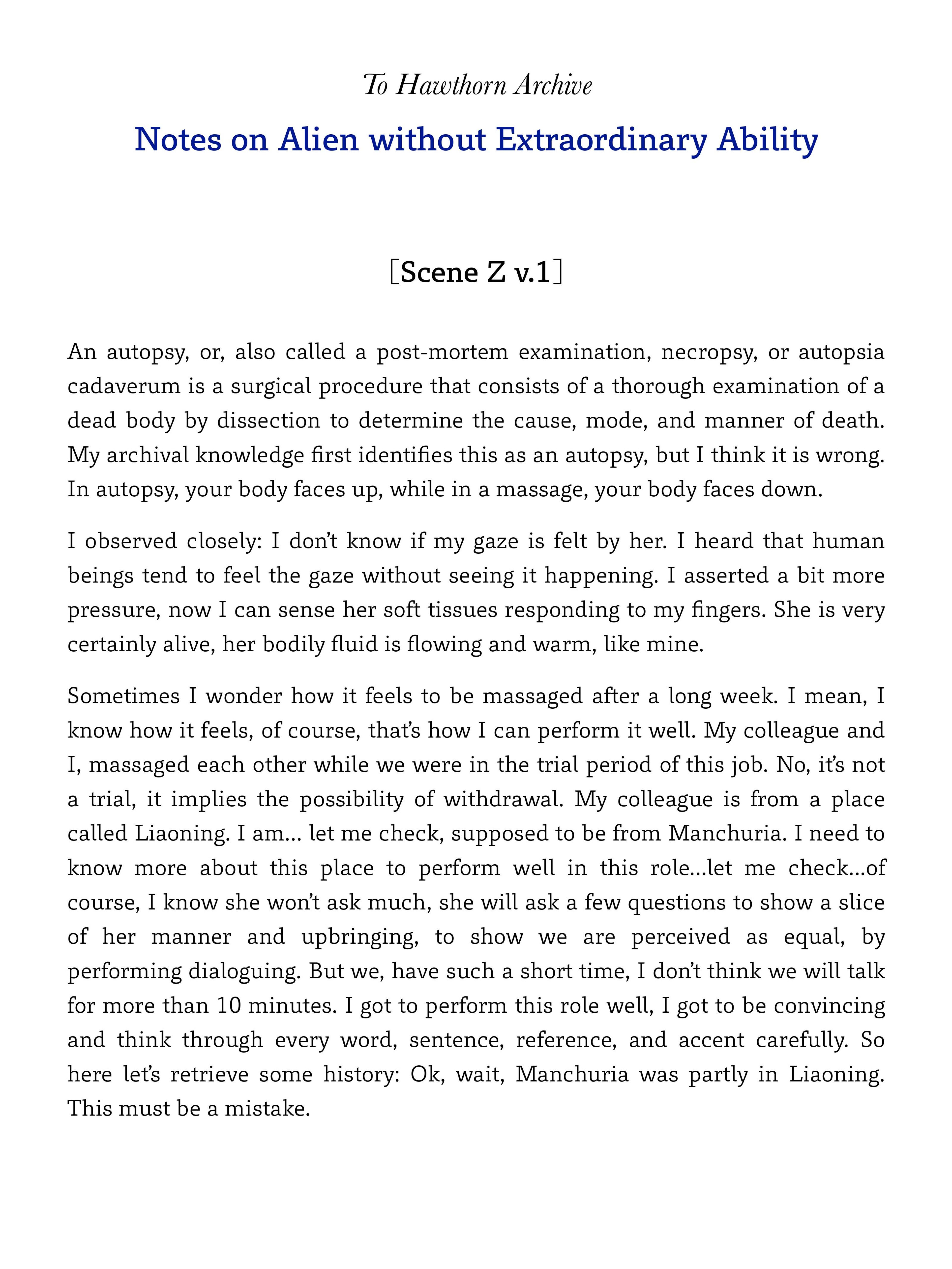
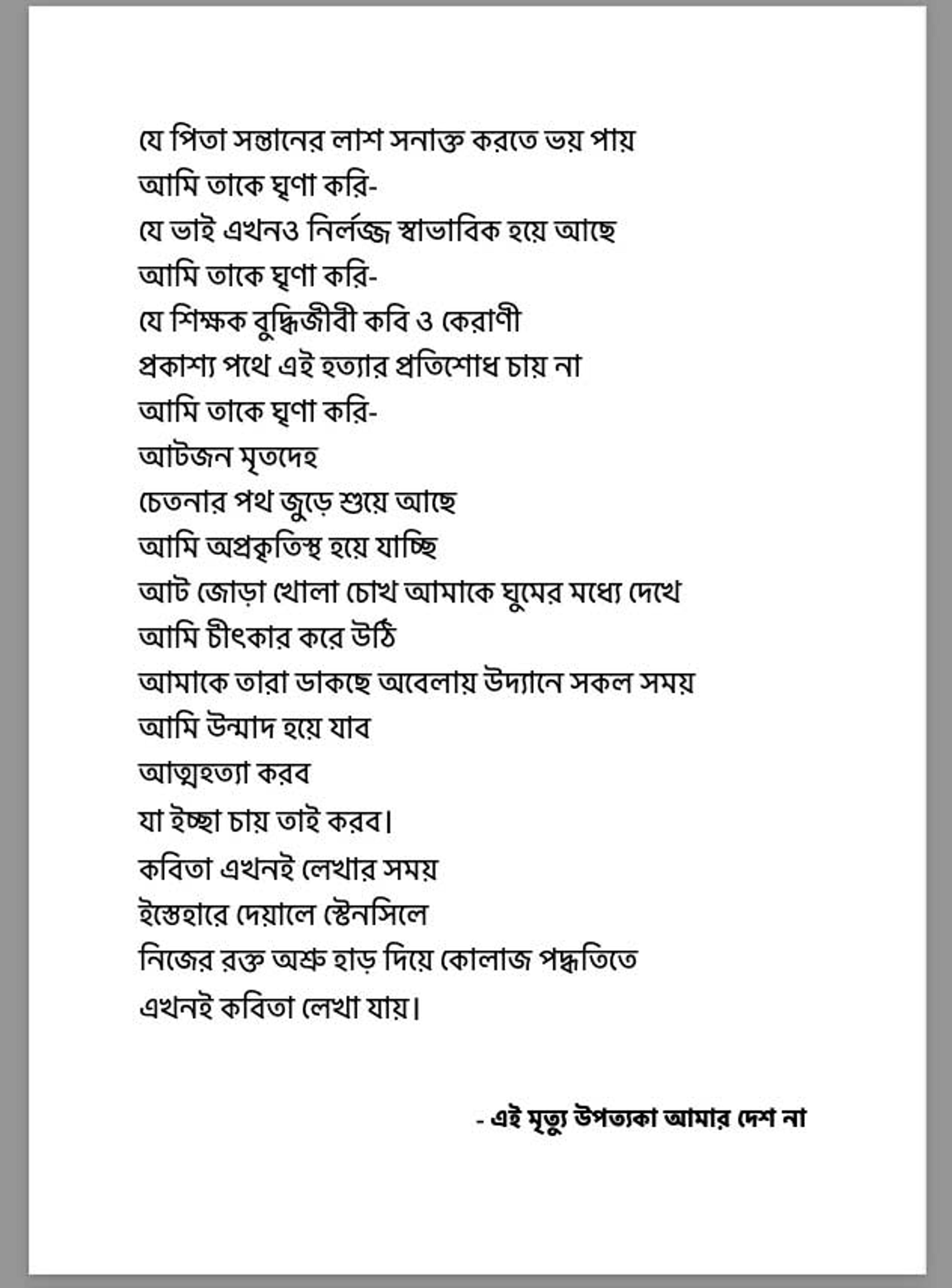
That father who fears identifying his child’s corpse
I despise him.
That brother who appears unashamedly normal
I despise him.
The teacher, the intellectual, the poet and the clerk
Who do not seek to revenge this daylight murder
I despise him.
Eight corpses,
Lie across the path of consciousness
I am losing my senses
Eight pairs of eyes wide open watching me in my sleep
I am screaming
They call me all the time to the gardens even when the hour is late
I will become mad
I will kill myself
I will do whatever I want.
Now is the time that we must write poetry
On billboards, on walls, in stencilled letters
With my own blood, bones and tears I make a collage.
It is the perfect time for poetry.
—This valley of death is no country of mine
Nabarun Bhattacharya’s poem evokes various textures of grief. The Grief of the father is laced with exasperation, rage and agony. This grief calls out not just to the human but also to nature, cities, infrastructure and social structures. “This Valley of Death is No Country of Mine” is a powerful reflection on the horrors of war, conflict and hostility, and the impact it has on ordinary people’s life. It destroys not just physical places, but also the emotional and spiritual connections that people have to their homes and communities.
Further, the time of mourning runs counter to the time of capital. Mourning requires an edifying stasis; this stasis threatens the time of ‘productivity’ where everything must be kept in motion perforce. Countering capital with mourning then becomes an act of resistance, it is through an insistence on mourning that we resist the onslaught of capital in our emotional and spiritual life.
Grief ought not to paralyse us, it is something that can also catalyse action. The act of sharing grief resists the atomisation of the spirit and the mind. Collective grief can also be imagined as an act of generosity and camaraderie, which can heal nations, communities, families and by extension, the whole world.
From Sujatro Ghosh
On this very warm sunday evening we gathered for the very first time during our free leisure day with five other participants of the „School Of Dissident Friendship“. A theme that has brought all of us together , but we never found out why or what were our personal motivations to apply in the first place. For me, clearly, to make new dissidents friends, or how Samuel taught me – rafeek – comrades in arabic.
So after spending an afternoon at the lake, we walked back to the metro station in this very bougie neighborhood of Dahlem, where all the historic villas are. We were talking loudly about everyday life topics, how to treat your hair, how to nurture it, about bad trips with psychedelic drugs and weed cookies. Samuel shared his drink, a special Mate-Ice-Tea and we were considering whether microdosing magic mushrooms, would support our creative practices.
Arriving at the station we missed that train „under the nose“, how you say in italian. A few of us set down, others were carrying their bikes. Maysa starting rolling a cigarette after having smoked at least ten at the lake, but collective moments of waiting eight minutes for the train had to be accompanied by a cigarette.
Maysa, who is very aware of german culture around rules and behaviors asked whether she is allowed to smoke at the train station to her german friend Lena, who doesn’t like living in constant repercussions of german authority (maybe even of German Guilt).
I didn’t hear the answer and was kind of craving for a puff of that cigarette, instead I observed how Maysa brought the litted cigarette to her mouth , inhaling-exhaling , while talking a lot to everyone around.
The moment she stopped smoking I leaned towards her, asking for a drag. Generously she offered me the whole cigarette, but given the circumstance that the small group was moving towards the incoming train, I didn’t feel like finishing it myself, and really smoking only makes sense when being together.
Dissident friendship, a scene
Sunday, 11 June 2023
at the U-Bahn station of Krumme Lanke, Berlin
Serena Abbondanza
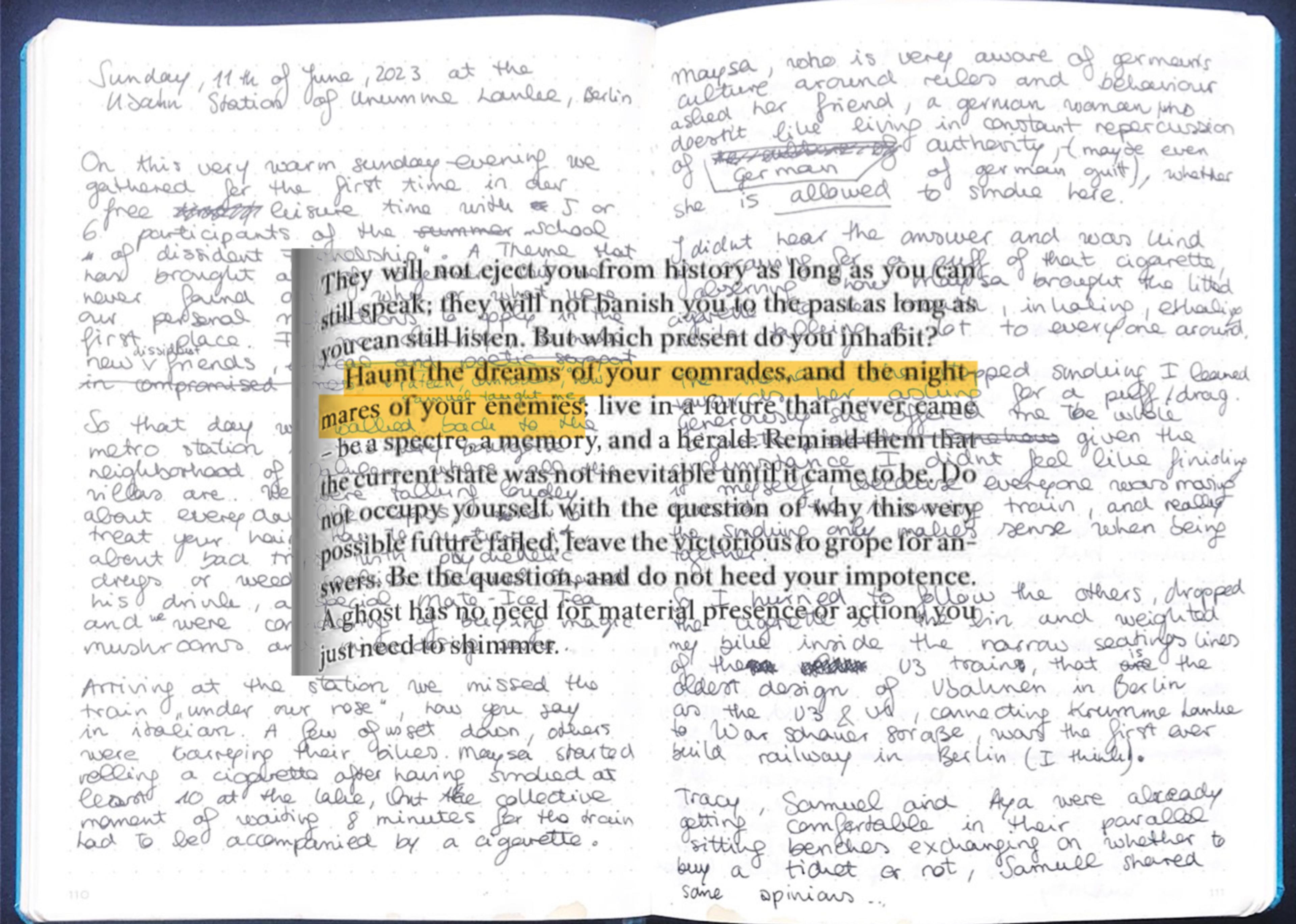
Quotations from Hassan Alwardany and Alaa Abd El-Fattah “You have not yet been defeated, Five Metaphors on Healing”
